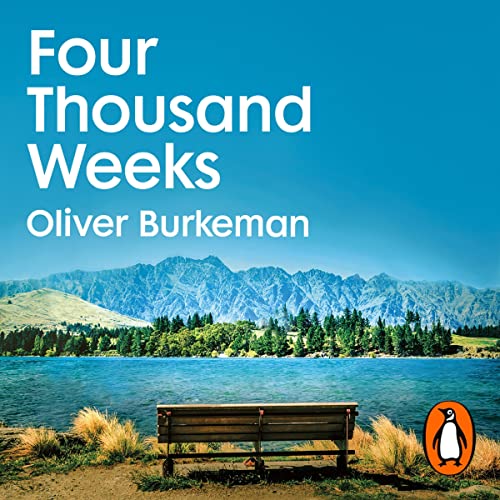Four Thousand Weeks By Oliver Burkeman — Book Summary and Notes
What ambitious investment is meaningful to undertake today, if you could come to terms with never seeing the results?
What ambitious investment is meaningful to undertake today, if you could come to terms with never seeing the results?
As the gig economy grows, busyness has been rebranded as ‘hustle’ — relentless work not as a burden, but as an exhilarating lifestyle choice worth boasting about. In reality, though, it’s the same old problem pushed to an extreme: the pressure to fit ever-increasing quantities of activity into a stubbornly on-increasing daily amount of time
In Four Thousand Weeks, Oliver Burkeman makes a case for embracing the truth about your limited time and limited control over that time in our lives.

Four Thousand Weeks
Time Management for Mortals By Oliver Burkeman
The Productivity Trap
Most of our days are spent trying to ‘get through’ tasks in order to get them ‘out of the way’. Becoming more efficient just to clear the decks and make them fill up again faster. The day will never arrive when you finally have everything under control—when the flood of emails has been contained; when you to-do lists have stopped getting longer; and when the fully optimised person you’ve become can turn, at long last, to the things life is really about.
Let’s start by admitting defeat: none of this is ever going to happen.
But you know what? That’s excellent news.
Life on the Conveyor Belt
No matter how far ahead you plan, you never get to relax in the certainty that everything’s going the way you’d like. To live like this is arguably insane, but it’s an insanity that is instilled in our minds from an early age, as New Age philosopher Alan Watts explains:
“Take education. What a hoax. As a child, you are sent to nursery school. In nursery school they say you are getting ready for kindergarten. And then first grade is coming up and second grade and third grade…. In high school they tell you you’re getting ready for college. And in college you’re getting ready to go out in the business world… like donkeys chasing after a carrot hanging in front of their faces. They are never here. They never get there. They are never alive.”
“Life, I knew, was supposed to be more joyful than this, more real, more meaningful, and the world was supposed to be more beautiful. We were not supposed to hate Mondays and live for the weekends and holidays. We were not supposed to have to raise our hands to be allowed to pee. We were not supposed to be kept indoors on a beautiful day, day after day” as environmentalist writer, Charles Eisenstein, recalls.
Choosing to Choose
From think about time in the abstract, it’s natural to start treating it as a resource, something to be bought and used as efficiently as possible. When you’re faced with too many demands, it’s easy to assume that the only answer must be to make better use of time instead of questioning whether the demands themselves might be unreasonable. None of us can single-handedly overthrow a society dedicated to limitless productivity, but right here, right now, you can stop buying into the delusion that any of that is ever going to bring satisfaction. You can face the facts.
The Limit-Embracing Life
We tend to speak about having a limited amount of time, but from philosopher Martin Heidegger’s perspective, we are a limited amount of time. Each decision presents a opportunity to select from an enticing menu of possibilities, when you might as well never have been presented with the menu to begin with. Your experiences of being alive consists of none other than the sum of everything to which you pay attention to. It is this thrilling recognition that the renunciation of alternatives is what makes your choice a meaningful one in the first place which gives the ‘joy of missing out’.
- Principle 1: Pay Yourself First (Enjoy the moment in the present because ‘that’ moment in the future may never arrive)
- Principle 2: Limit your work in progress (Fix an upper limit on the number of projects you work on at any given time)
- Principle 3: Resist the allure of middle priorities (Focus on only the highest priorities before moving down the list)
The future, which we dispose of to our liking, appears to us at the same time under a multitude of forms, equally attractive and equally possible. The idea of the future with infinite possibilities is thus more fruitful than the future itself, and this is why we find more charm in hope than in possessions, in dreams than in reality.
Seeking Boredom
Boredom—an intense reaction to the deeply uncomfortable experience of confronting our limited control. It demands that we face our finied. We’re obliged to deal with how our experience is unfolding in the moment, to resign ourselves to the reality that this is it.
Each time you open a social media app, there are a “thousand people on the other side of the screen” paid to keep you there. No wonder we seek out distractions online, “a realm in which space doesn’t matter and time spreads out into an endless present”. But doesn’t need to be fun. It just needs to make you feel unconstrained to dull the pain of finitude.
Paradoxically, accepting reality’s constraints is what makes us feel no longer constrained. To accept the unpleasantness is simply what it feels like for finite humans to commit ourselves to the demanding and valuable tasks that force us to confront our limited control over how our lives unfold. We should aspire to confine our attention to the only portion of time that really is any part of our business.
Five Questions
- Where in your life are you currently pursuing comfort, when what’s called for is a little discomfort?
- Are you holding yourself to, and judging yourself by standards of productivity that are impractical to meet?
- In what ways have you yet to accept the fact that you are who you are, not the person you think you ought to be?
- In which ares of life are you still holding back until you feel like you know what you’re doing?
- How would you spend your days differently if you didn’t care so much about seeing your actions reach fruition?
As Thomas Wolfe writes, “we are the sum of all the moments of our lives, all that is ours in them: we cannot escape it or conceal it. If we’re going to show up for, and thus find some enjoyment in, our brief time on the planet, we had better show up for it now”
